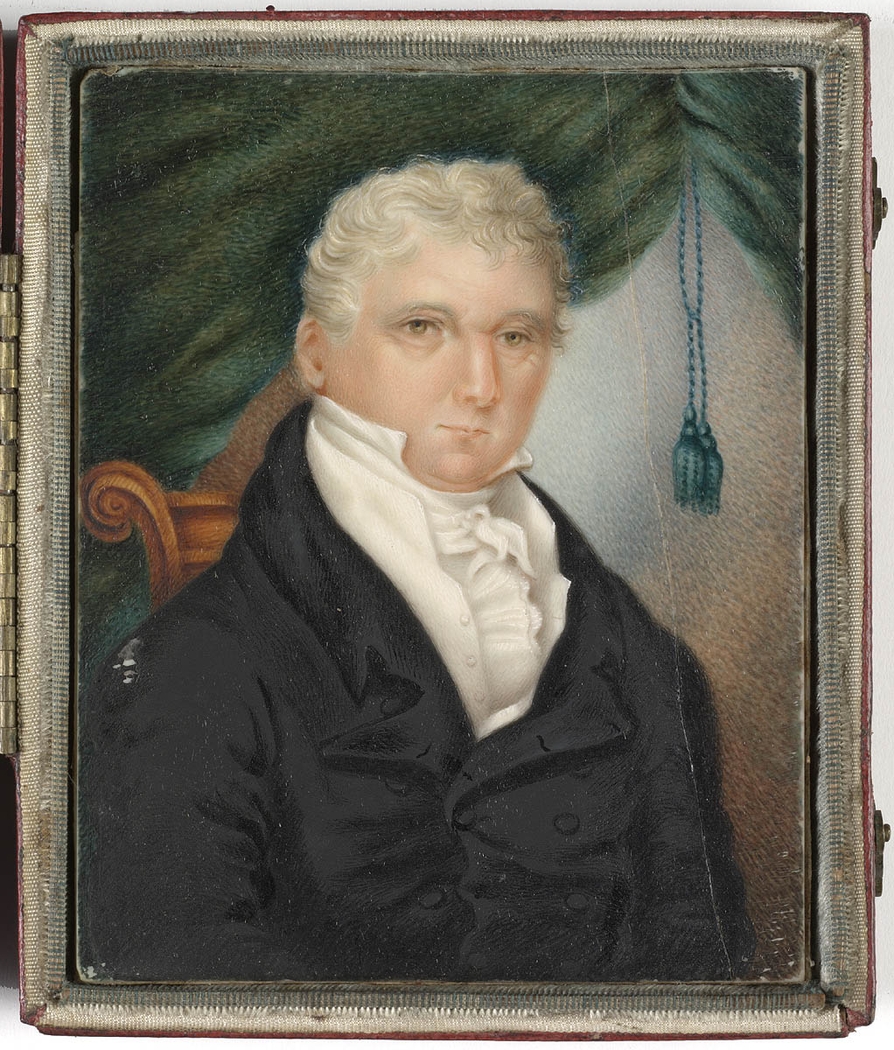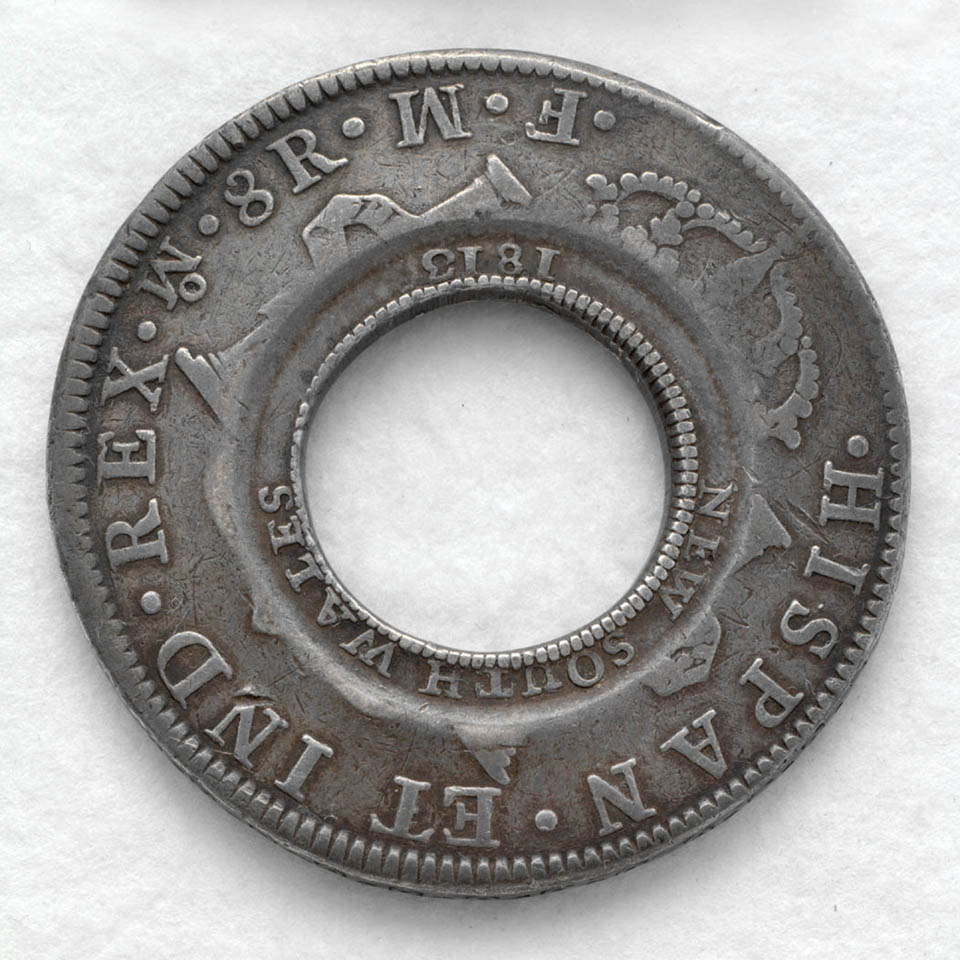The Dictionary of Sydney was archived in 2021.
Macquarie, Lachlan
Citation
Persistent URL for this entry
To cite this entry in text
To cite this entry in a Wikipedia footnote citation
To cite this entry as a Wikipedia External link
Macquarie, Lachlan
[media]Few governors of New South Wales are as favourably remembered as Lachlan Macquarie, and for a variety of reasons. He has passed into the history books as a builder, an innovative reformer who created 'an ordered civil society' in Sydney Town, and the man who gave Sydney its first local currency, in the form of the 'holey dollar' and the 'dump'.
[media]Macquarie was sworn in at Sydney on New Year's Day 1810, to take up the reins of government after the interregnum that followed the deposing of Governor William Bligh two years earlier.
Builder
[media]Part of the reason for Macquarie's hallowed status is his legacy of fine buildings – most notably a new barracks, completed in 1810, and a hospital, built by the principal surgeon D'Arcy Wentworth and two other colonists, and paid for by giving them a limited monopoly over importing spirits. He was also responsible for two pieces of critical infrastructure – the road to Parramatta, completed in April 1811, and the road to the South Head, completed in mid-1811.
These undertakings were the first in an extensive building program which transformed Sydney, Parramatta and the new townships. He was assisted in this work by Francis Greenway, a convict he appointed as civil architect. On his return to England in the early 1820s, Macquarie listed 265 works of varying scale which had been carried out during his period as governor.
Social reformer
Macquarie's building program had been accomplished with the use of convict labour, which became increasingly plentiful as time went on. As the number of the colony's residents who had served out their sentences grew, the issue of their status, as free citizens again, in a penal colony, became acute.
[media]Macquarie's solution – an added inducement to reform – was that ex-convicts, when they had shown that they deserved it, should be readmitted to the rank in society they had forfeited. Accordingly he appointed two emancipists as magistrates in 1810, and invited them and other 'freed men' to his house. But his emancipist policy also led to a falling out with many of the free settlers and the military officers, who felt that such a policy was inappropriate in a penal colony and denigrated their own status.
Macquarie had good reasons for pursuing his emancipist policy. Apart from philosophical and humanitarian reasons, it was part of his plan for the creation of an 'ordered, civil society', especially after he decided that many of the free immigrants – the so-called 'respectable Monied Men' – were unsatisfactory settlers in a harsh frontier penal society; as well, he was disappointed at their reluctance to fraternise with ex-convicts. The ongoing 'emancipists' versus 'exclusives' conflict arose from his policies.
Aboriginal people
[media]Macquarie was interested in the welfare of the Sydney's Indigenous inhabitants, and some of his policies have been interpreted as an expression of his 'humanitarian conscience'[1]. He organised a village at Elizabeth Bay for the 'Sydney Tribe', a farm at George's Head for Bungaree and the Broken Bay people, the Parramatta Native Institution, and the annual meeting with the Eora peoples at Parramatta. Despite this, he was also responsible for giving orders for the military operation that resulted in the Appin massacre in which at least 14 men, women and children of the Dharawal people were brutally killed.
Financial innovator
[media]With the economy expanding, and with sterling flowing out continuously to pay for imports, the colony needed a stable medium of exchange, one that was 'Indigenous' to Sydney Town. Macquarie's ingenious solution, implemented in July 1813, was to stamp out the centre of the Spanish silver dollar – the Maria Theresa dollar – creating two coins, the holey dollar and the dump, that worked as currency only in the colony, in place of the notes of hand and barter previously used. At the end of 1816, despite the opposition of the British government, he encouraged the creation of the colony's first bank, the Bank of New South Wales.
Public moralist
[media]Macquarie was also concerned about 'public morality', in its widest sense. In some of his earliest orders, the prevailing habit of cohabiting without marriage was denounced; the Sydney police were reorganised and constables were directed to enforce laws against Sabbath-breaking; and a regular church parade was introduced for convicts in government employment. Closely connected with all this were his energetic establishment of schools in Sydney and elsewhere; his licensing regulations which reduced the number of public houses in Sydney alone from 75 to 20; and his seizure of clandestine stills.
Macquarie could not, however, solve all the colony's problems. One fairly intractable one was an inability to increase agricultural production and livestock numbers, critical in a colony perennially short of food. Despite his efforts to encourage farmers to improve their holdings, the spectre of alternate glut and famine continued to threaten the colony during most of his administration.
References
ND McLachlan, 'Macquarie, Lachlan (1762–1824)', Australian Dictionary of Biography, vol 2, Melbourne University Press, Melbourne, 1967, pp 187–95
Hawkesbury Historical Society website, 'Lachlan Macquarie', http://www.hawkesburyhistory.org.au/articles/macquarie.html, viewed 19 February 2009
Parliament of New South Wales website, '1810 to 1821 – Governor Lachlan Macquarie', http://www.parliament.nsw.gov.au/prod/web/common.nsf/key/HistoryGovernorLachlanMacquarie, viewed 19 February 2009
Notes
This entry was revised in June 2020 to include additional information about Macquarie's relationship with Sydney's Aboriginal people.
[1] N.D. McLachlan, Macquarie, Lachlan (1762–1824) Australian Dictionary of Biography (1967) website https://www.adb.anu.edu.au/biography/macquarie-lachlan-2419









